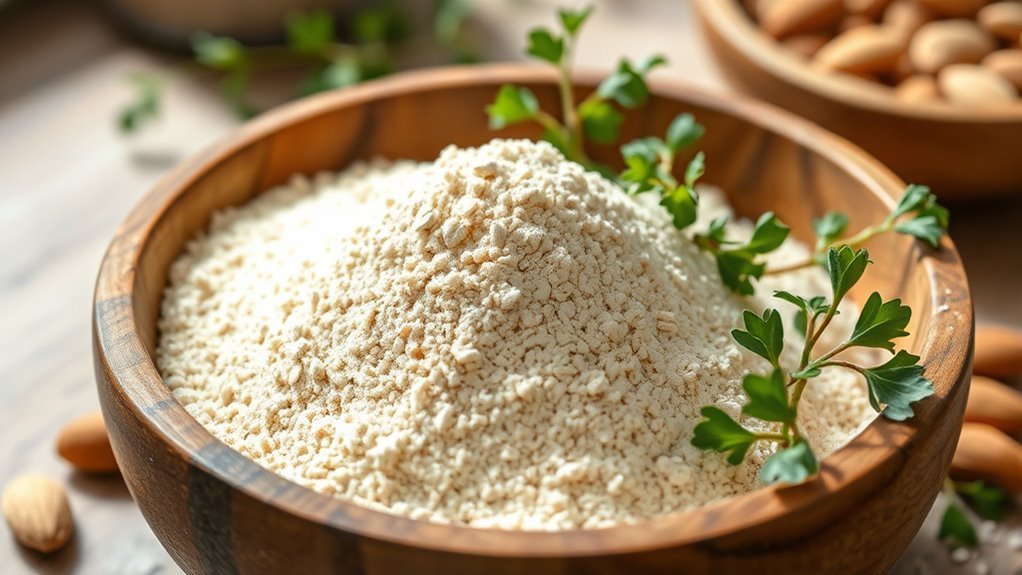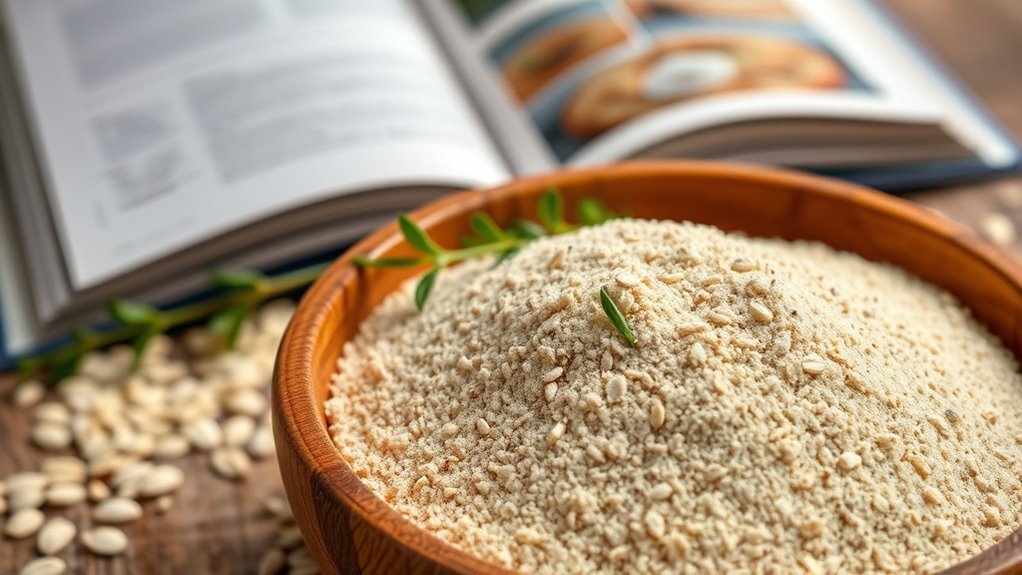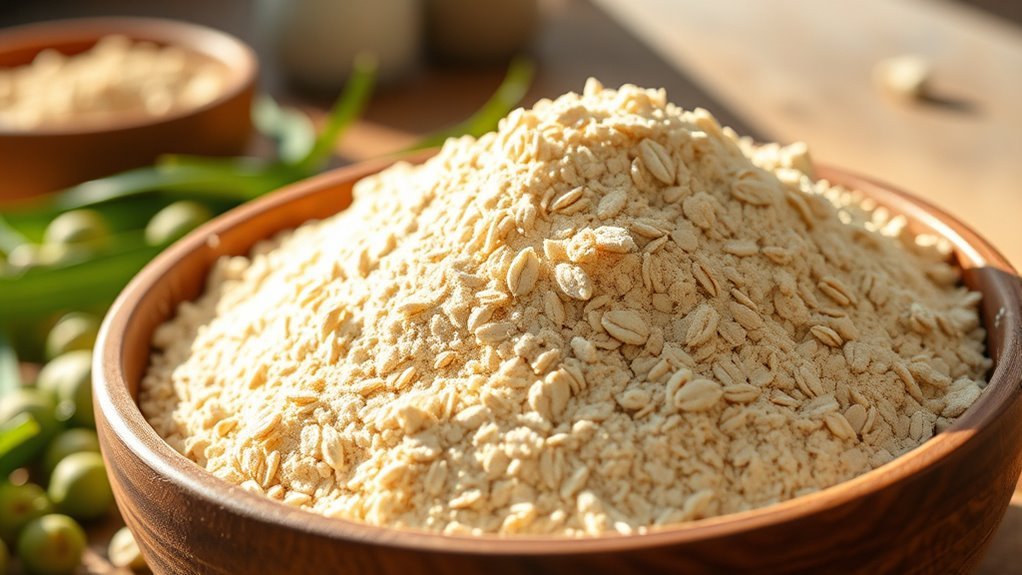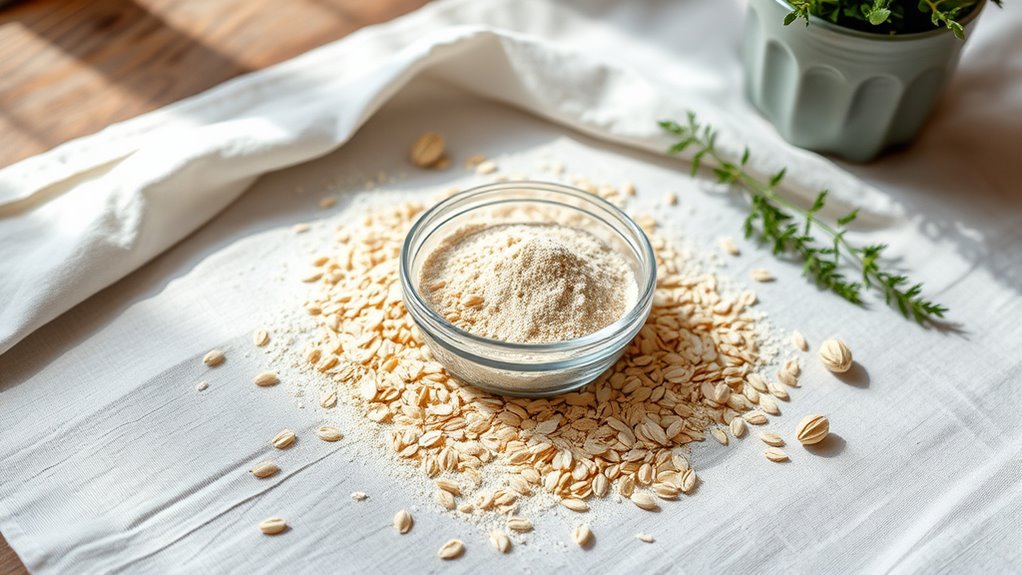Oat flour isn’t considered keto-friendly because it contains about 60 grams of carbs per 100 grams, which can make sustaining ketosis tough. While it offers health benefits like fiber for heart health and digestion, its high carbohydrate content can hinder your low-carb goals. If you’re looking for alternatives, you might want to explore flours that are better suited for keto diets. There’s more you can learn about using oat flour and other options for your baking needs.
Understanding Oat Flour: Nutritional Profile

Oat flour, a popular alternative to traditional wheat flour, offers a unique nutritional profile that’s worth exploring. You’ll find that it’s rich in fiber, particularly beta-glucans, which can support heart health and aid digestion. Additionally, oat flour is packed with essential vitamins and minerals like magnesium, iron, and B vitamins, providing considerable oat flour benefits. When it comes to oat flour uses, it’s incredibly versatile; you can incorporate it into baked goods, smoothies, or even as a thickening agent in soups. This alternative flour can cater to various dietary preferences, including gluten-free options when sourced carefully. So, if you’re looking to diversify your cooking or baking repertoire, oat flour is definitely worth considering.
Carb Count Comparison: Oat Flour vs. Other Flours

When considering carb counts, oat flour contains about 60 grams of carbohydrates per 100 grams, which is considerably higher than almond flour’s 20 grams. In contrast, traditional wheat flour has around 76 grams of carbs in the same serving size. By comparing these options, you can better understand which flour aligns with your dietary goals.
Oat Flour Carb Content
While many people turn to various flours for their baking needs, understanding the carbohydrate content is essential, especially for those following a keto diet. Oat flour contains approximately 60 grams of carbs per 100 grams, which can be quite high for keto adherents aiming for low carb intake. However, it offers oat flour benefits like higher fiber content and a unique flavor profile. If you’re looking for alternatives, consider oat flour substitutes such as almond flour or coconut flour, which typically have lower carb counts. These options can help you maintain your desired macros while still enjoying the baking experience. Ultimately, it’s about finding the right balance that fits your lifestyle and dietary goals.
Comparison With Almond Flour
If you’re considering different flours for your baking needs, comparing their carb counts can be essential for maintaining a keto-friendly diet. Oat flour contains about 60 grams of carbs per 100 grams, while almond flour has around 20 grams. This almond flour comparison highlights a significant difference, making almond flour a more suitable choice for those on a strict keto regimen. However, oat flour benefits include its higher fiber content and nutritional profile, which can be appealing for some bakers. Ultimately, your choice may depend on your specific dietary goals and preferences. If you’re looking for lower carbs, almond flour is the way to go, but if you want added nutrients, consider incorporating oat flour in moderation.
Wheat Flour Carb Levels
Wheat flour is another common option in baking, but its carb content can be a concern for those following a keto diet. Typically, a cup of all-purpose wheat flour contains around 95 grams of carbs, making it one of the highest carb sources among flours. While its gluten content gives baked goods a desirable structure and texture, it’s not ideal for low-carb lifestyles. In contrast, oat flour contains fewer carbs, around 64 grams per cup, and may offer more fiber. If you’re seeking alternatives for keto baking, consider almond or coconut flour, which provide lower carb counts and different baking properties. Ultimately, understanding these differences helps you make informed choices that align with your dietary goals.
The Role of Fiber in Oat Flour

Fiber plays an essential role in the nutritional profile of oat flour, offering various health benefits that you might find appealing. Not only does it support healthy digestion, but it can also help maintain stable blood sugar levels. Understanding these benefits can aid you in making informed choices about incorporating oat flour into your diet.
Nutritional Benefits of Fiber
While many people focus on macronutrients when considering their diets, the importance of fiber often gets overlooked, especially in oat flour. Oat flour is rich in soluble fiber, which brings numerous health benefits. It can help regulate blood sugar levels and lower cholesterol, contributing to heart health. This fiber also plays an essential role in providing digestive support, keeping your gut in check and promoting regularity. By incorporating oat flour into your meals, you not only enjoy its versatility but also boost your fiber intake, which many diets lack. Embracing the nutritional benefits of fiber can empower you to make informed choices, enhancing both your well-being and your culinary experience. So, consider oat flour as a valuable addition to your diet.
Fiber’s Impact on Digestion
Incorporating oat flour into your diet not only enhances your meals but also greatly influences digestive health. Oat flour is rich in soluble and insoluble fiber types, both of which offer significant digestion benefits. Soluble fiber forms a gel-like substance in your gut, helping to regulate blood sugar levels and reduce cholesterol. Insoluble fiber, on the other hand, adds bulk to your stool, promoting regular bowel movements and preventing constipation. By including oat flour, you’re not just elevating your recipes; you’re also supporting a healthy digestive system. This balance of fiber types aids in nutrient absorption and fosters a sense of fullness, making it easier to maintain a balanced diet while enjoying the freedom of varied meals.
Oat Flour and Ketosis: Is It Compatible?
When assessing whether oat flour fits into a ketogenic diet, it’s essential to examine its carbohydrate content. Oat flour contains more carbs than typical keto-friendly flours, which can impact your ability to maintain ketosis. Here are some factors to evaluate for keto compatibility:
Evaluating oat flour for a ketogenic diet requires careful consideration of its high carbohydrate content.
- Carbohydrate Count: Oat flour has about 60 grams of carbs per cup.
- Dietary Restrictions: It may not align with strict low-carb guidelines.
- Ketosis Effects: Consuming oat flour could hinder your progress in achieving ketosis.
- Alternatives: Think about using almond or coconut flour instead, which are more keto-friendly.
Creative Ways to Use Oat Flour on a Low-Carb Diet
Many people looking to reduce carbs might wonder how to creatively incorporate oat flour into their meals. You can whip up delicious oat flour pancakes, which provide a hearty start to your day without excessive carbs. Simply mix oat flour with eggs, almond milk, and a touch of sweetener to create a satisfying breakfast option.
Another fantastic idea is to bake oat flour muffins. These can be customized with low-carb ingredients like berries or nuts, making a tasty snack or a quick grab-and-go breakfast.
Alternatives to Oat Flour for Keto Baking
For those on a keto diet, finding the right flour alternatives is key to maintaining low carbohydrate intake while still enjoying baked goods. Here are some great options to contemplate:
- Coconut Flour: A low-carb favorite, it’s highly absorbent, so you’ll need less of it.
- Almond Meal: Rich in healthy fats and protein, it adds a nice texture to baked goods.
- Flaxseed Meal: Packed with fiber, it’s excellent for binding and adds a nutty flavor.
- Sunflower Seed Flour: A nut-free option that works well in cookies and breads.
You can also explore hazelnut flour, pumpkin seed flour, or even cassava flour for diverse baking experiences. Remember, experimenting is part of the fun!
Frequently Asked Questions
Can Oat Flour Be Used in Gluten-Free Recipes?
Yes, you can definitely use oat flour in gluten-free recipes! It’s a great choice because it adds a nutty flavor and a pleasant texture to your baked goods. Oat flour benefits include being rich in fiber and nutrients, which can enhance the overall quality of your gluten-free baking. Just make sure to check that your oat flour is certified gluten-free to avoid cross-contamination. Enjoy experimenting with this versatile ingredient!
How Does Oat Flour Affect Blood Sugar Levels?
Imagine you’re enjoying a warm bowl of oatmeal, only to discover it spikes your blood sugar. Oat nutrition is rich in fiber, which can help stabilize blood sugar levels, but oat flour may still cause a rise in some individuals. A study showed that while whole oats have a lower glycemic index, processed oat flour can lead to quicker glucose absorption. Balance is key, so monitor your intake to maintain healthy levels.
What Are the Best Storage Methods for Oat Flour?
To store oat flour effectively, use airtight storage containers to prevent moisture and pests. Keep it in a cool, dark place, like a pantry, for ideal shelf life. If you want to extend its freshness, consider refrigerating or freezing it, which can last up to six months or longer. Always label your containers with the date opened to keep track of freshness. Proper storage helps maintain quality and guarantees you enjoy its benefits longer.
Is Oat Flour Suitable for People With Celiac Disease?
Imagine walking through a field of golden oats, but for those with celiac disease, the beauty can be deceptive. While oat flour’s safety can be appealing, it’s essential to take into account gluten cross contamination. Many oats are processed in facilities that handle wheat, which can introduce gluten. As a result, if you’re sensitive, choose certified gluten-free oat flour to verify it’s safe for your diet. Always prioritize your health when making food choices.
Can I Substitute Oat Flour for Regular Flour in All Recipes?
You can substitute oat flour for regular flour in many recipes, but it’s important to make some baking adjustments. Oat flour has unique properties, like higher fiber content, which can lead to denser baked goods. For lighter textures, consider mixing it with other flours. The benefits of oat flour include added nutrients and a slightly sweet flavor. Experimenting can help you find the right balance for your favorite recipes while enjoying its health perks.
Frequently Asked Questions about Oat Flour and Keto Diet
1. Is oat flour considered keto-friendly?
Oat flour is generally not considered keto-friendly due to its higher carbohydrate content. A standard serving can contain around 20-25 grams of carbs, which can significantly exceed the daily carb limit for those following a strict ketogenic diet, typically ranging between 20 to 50 grams of net carbs per day.
2. What are the nutritional benefits of oat flour?
Oat flour is rich in essential nutrients, including fiber, vitamins, and minerals. It contains beta-glucans, which are known to support heart health and improve cholesterol levels. Additionally, oat flour provides antioxidants and can aid in digestive health. However, if you’re on a keto diet, these benefits may not outweigh the high carb content.
3. Can I use oat flour in moderation on a keto diet?
While some individuals on a keto diet may choose to include oat flour in moderation, it is crucial to carefully monitor your overall carbohydrate intake. If you can fit a small amount of oat flour into your daily carb allowance without exceeding it, it might be possible to enjoy it. However, it’s advisable to focus on lower-carb alternatives like almond flour or coconut flour for baking and cooking.
4. What are some low-carb alternatives to oat flour?
Several low-carb alternatives to oat flour are suitable for a keto diet. Almond flour and coconut flour are popular choices, as they have significantly lower carbohydrate content. Flaxseed meal and sunflower seed flour are also excellent options. These alternatives can often be used in similar ratios to oat flour in recipes, but adjustments may be necessary due to differences in texture and moisture absorption.
5. How can I incorporate oat flour into my diet if I’m not strictly keto?
If you are not strictly adhering to a keto diet, oat flour can be a healthy addition to your meals. You can use it in baking, such as in muffins, pancakes, and cookies. It can also be added to smoothies for a nutritious boost. Remember to balance your meals with protein and healthy fats to maintain a well-rounded diet. Always ensure that your overall carbohydrate intake aligns with your dietary goals.
References
- https://www.healthline.com/nutrition/oat-flour-keto
- https://www.ncbi.nlm.nih.gov/pmc/articles/PMC6313450/
- https://www.medicalnewstoday.com/articles/oat-flour
- https://www.webmd.com/diet/oats
- https://www.cdc.gov/nutrition/resources-publications/index.html
- https://www.eatright.org/food/nutrition/dietary-restrictions/the-keto-diet
- https://www.researchgate.net/publication/334267123_The_Impact_of_Diet_on_Ketosis_and_Nutrition
- https://www.nutrition.gov/topics/food-safety/food-safety-resources


